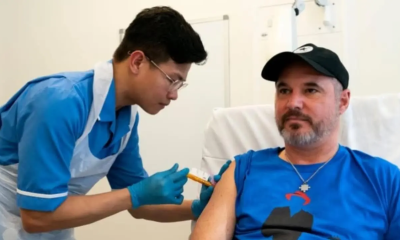
One billion people are expected to be affected by osteoarthritis by 2050, according to study
Follow Us @
One billion people are expected to be affected by osteoarthritis by 2050, according to study
– how to remain healthy, health related news, latest symptoms and treatments.
The number of cases of osteoarthritis, a degenerative disease that affects cartilage, is growing globally. A study by the Institute for Health Metrics and Evaluation at the University of Washington predicts that around 1 billion people worldwide will be affected by osteoarthritis by 2050. Currently, 15% of the population over 30 years old already shows the first signs of osteoarthritis. disease, according to research published in the scientific journal The Lancet Rheumatology, which analyzed data from more than 200 countries over 30 years.
In Brazil, 15 million people have been diagnosed with osteoarthritis, and the disease is responsible for 7.5% of absences from work and is the fourth most common cause of retirement, according to the Ministry of Health. The National Institute of Traumatology and Orthopedics launched an awareness movement about osteoarthritis at the end of last year, due to the significant prevalence of the disease.
Reasons for osteoarthritis cases
The increase in cases of osteoarthritis is linked to the aging of the population and other factors, such as obesity, sedentary lifestyle and impactful physical activities, according to experts. The wear of cartilage leads to friction between the bones, causing pain, inflammation and deformities that can limit movement. Although joint pain is the most common symptom, the disease can also be asymptomatic in some patients.
Although associated with aging, osteoarthritis also affects young people and is more common in joints that bear more weight, such as the feet, hips, spine and knees. Treatment varies according to the severity, with mild and moderate cases seeking to control pain and inflammation and improve mobility, while in advanced cases joint replacement surgery may be indicated.
Cartilage wear causes pain (Photo: reproduction/Getty Images Embed)
How to mitigate the problem
It is crucial to adopt non-pharmacological interventions to prevent the progression of osteoarthritis. These measures include awareness of triggering and aggravating factors, treatment of obesity, monitored physical exercise, correction of tendinopathies and other structural injuries, as well as joint protection measures and use of orthoses as necessary.
Changes in lifestyle habits, such as a balanced diet, regular exercise and preventive care from childhood, are also essential to prevent or delay the onset of the disease, even considering the influence of hormonal and genetic factors on its pathology.
Featured photo: Osteoarthritis is a degenerative disease that affects cartilage (Reproduction/Getty Images Embed)
One billion people are expected to be affected by osteoarthritis by 2050, according to study
Follow AFRILATEST on Google News and receive alerts for the main news about celebrities, soap operas, series, entertainment and more! One billion people are expected to be affected by osteoarthritis by 2050, according to study
SHARE POST AND EARN REWARDS:
Join our Audience reward campaign and make money reading articles, shares, likes and comment >> Join reward Program
FIRST TIME REACTIONS:
Be the first to leave us a comment – One billion people are expected to be affected by osteoarthritis by 2050, according to study
, down the comment section. click allow to follow this topic and get firsthand daily updates.
JOIN US ON OUR SOCIAL MEDIA: << FACEBOOK >> | << WHATSAPP >> | << TELEGRAM >> | << TWITTER >
One billion people are expected to be affected by osteoarthritis by 2050, according to study
#billion #people #expected #affected #osteoarthritis #study
-

 Fashion3 months ago
Fashion3 months agoVogue Arabia cover welcomes Salma Hayek in an interview with Penélope Cruz
-

 Football3 months ago
Football3 months agoVAR points out Diego Costa's offense against the fourth referee
-

 USA today entertainment3 months ago
USA today entertainment3 months agoBeyonce with the single “Break My Soul” leads on Spotify Brazil
-

 Health and Fitness3 months ago
Health and Fitness3 months agoVaccine against the reappearance of skin cancer enters final testing phase
-

 USA today entertainment3 months ago
USA today entertainment3 months agoSZA, Future and DJ Khaled come together in collaboration
-

 News3 months ago
News3 months agoParents of former player Waleswska are pressured by widower to pay rent for the house where they live
-

 USA today entertainment3 months ago
USA today entertainment3 months agoLarissa Luz and Linn da Quebrada enchant at the Multishow Awards with a tribute to Elza Soares.
-

 Good News TV series3 months ago
Good News TV series3 months agoThe shocking reason behind the decision not to show dead characters in The Last Of Us episode revealed













































